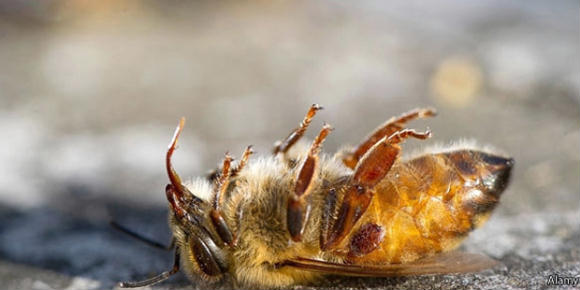
Pesticide manufacturers spend millions to hide disappearance of bees
Published in November 23, 2015
 Two neonicotinoids widely used in the manufacture of pesticides appear to seriously harm colonies of bees, according to a study of Harvard School of Public Health. In April 2015, to magazine Science published two additional studies that corroborate the findings of Harvard on neonicotinoids used in seed treatment for more than 140 crops. These systemic pesticides manufactured by Bayer, Syngenta is Monsantoare absorbed by the roots and leaves and distributed throughout the plant, including its pollen and nectar.
Two neonicotinoids widely used in the manufacture of pesticides appear to seriously harm colonies of bees, according to a study of Harvard School of Public Health. In April 2015, to magazine Science published two additional studies that corroborate the findings of Harvard on neonicotinoids used in seed treatment for more than 140 crops. These systemic pesticides manufactured by Bayer, Syngenta is Monsantoare absorbed by the roots and leaves and distributed throughout the plant, including its pollen and nectar.
The report is published by Mapocho Press, 01-11-2015. The translation is André Langer.
For pollinators, low-level exposure can lead to sublethal effects, as learning change, deficiency in the search for food and immunosuppression; exposure to higher levels can be lethal.
In response to scientific evidence of this kind, the three main pesticide-producing companies - Bayer, Syngentais Monsanto - participate in massive public relations campaigns, carried out at a cost that exceeds 100 million dollars and employing tactics similar to those used for decades by large tobacco companies to deny the harmful effects on public health.
How to report Michele Simon in a study of Friends of the Earth (Friends of the Earth), these tactics include creating distractions to blame anything, minus insecticides, by documented collapses in bee populations, including, for example, accusations against farmers for alleged misuse of pesticides. These companies also attack scientists and journalists to discredit their conclusions.
At the same time, Bayer, Syngenta is Monsanto try to buy credibility by cultivating strategic alliances and associations with farmers, beekeepers and agricultural organizations with the hope of representing themselves as “bee-friendly”. Like this, for example, a Monsanto announced the formation of a Advisory Council of the Honey Bee, a strategic alliance of executives from Monsanto and other. A British Beekeepers Associationreceived important funding from Bayer, Syngenta and other insecticide companies. In exchange, insecticides were approved as “friendly with bees”.
As reported Rebecca Wilce to the PR Watch, “Instead of taking action on a problem that threatens food production worldwide, insecticide companies have taken a page from the tobacco industry playbook to gradually increase efforts to sow doubts about the magnitude of the problem and its own potential role in the crisis ”. Against, pointed Wolves, a European Union put in place a two-year ban on the use of the three most common neonicotinoids: imidacloprid, clotianidina e tiametoxam.
Writing for Wired, in June 2014, Brandom Keim reported on another study byFriends of the Earth showing florists from big stores in the América do Norte, including Home Depot, Lowe is Walmart, selling plants with ‘ostensibly friendly with bees’, but what, as a matter of fact, contain high levels of neonicotinoids. The study found that 36 from 71 (51%) samples of garden plants purchased at the main florists in 18 cities of U.S is Canada contained neonicotinoid pesticides. 40% positive samples contained two or more types of neonicotinoids. "Unfortunately", wrote the authors of the report, “Residential gardeners have no idea that in reality they may be poisoning pollinators through their efforts to plant bees-friendly gardens”.
Although the main news media, for example, O New York Times, O Washington Post and the National Public Radio published two branded cover ads Nature on the negative effects of neonicotinoids on bees, but did not report on the public relations campaigns of the Bayer, Syngenta is Monsanto, that aim to undermine the conclusions of scientific studies and deflect the blame for pesticides.
In the same way, these press media covered the announcement of the Lowes that it will no longer sell products containing neonicotinoids, but did not report that “bee-friendly” plants sold at flower shops in U.S in reality they may be deceiving well-meaning customers and exposing pollinators to neonicotinoids in their own family gardens.
Source:
Michele Simon, “Follow the Honey: 7 Ways Pesticide Companies Are Spinning the Bee Crisis to Protect Profits,” Friends of the Earth, April 28, 2014, http://www.foe.org/news/blog/2014-04-follow-the-honey-7-ways-pesticide-companies-are-spinning-bee-crisis .
Rebekah Wilce, “Pesticide Firms Use Tobacco Playbook to Spin Bee Crisis,” PR Watch, Center for Media and Democracy, May 12, 2014, http://www.prwatch.org/news/2014/05/12468/pesticide-industry-uses-big-tobacco-playbook-spin-bee-crisis#sthash.gy3guWE9.dpuf.
Timothy Brown et al., “Gardeners Beware 2014: Bee-Toxic Pesticides Found in ‘Bee-Friendly’ Plants Sold at Garden Centers across the U.S. and Canada,” Friends of the Earth, June 2014,http://www.foe.org/projects/food-and-technology/beeaction.
Brandon Keim, “How Your Bee-Friendly Garden May Actually Be Killing Bees,” Wired, June 25, 2014,http://www.wired.com/2014/06/garden-center-neonicotinoids.
(EcoDebate, 23/11/2015) published by IHU On-line, editorial partner of the electronic magazine EcoDebate in the socialization of information.
[IHU On-line is published by Instituto Humanitas Unisinos - IHU, from the University of Vale do Rio dos Sinos ?? Unisex, in São Leopoldo, RS.]
[CC BY-NC-SA 3.0][ EcoDebate content can be copied, reproduced and / or distributed, provided that credit is given to the author, to Ecodebate and, if any, to the primary source of the information ]
Original article: http://www.ecodebate.com.br/2015/11/23/fabricantes-de-pesticidas-gastam-milhoes-para-ocultar-desaparecimento-de-abelhas

Sorry, the comment form is closed at this time.